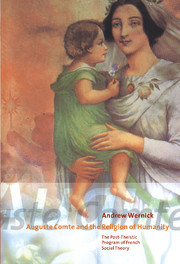Book contents
- Frontmatter
- Dedication
- Contents
- Acknowledgments
- 1 Introduction: rethinking Comte
- 2 The system and its logic (I): from positive philosophy to social science
- 3 The system and its logic (2): from sociology to the subjective synthesis
- 4 Religion and the crisis of industrialism
- 5 Love and the social body
- 6 The path to perfection
- Humanity as ‘le vrai Grand-Être’
- 8 Socio-theology after Comte
- References
- Index
4 - Religion and the crisis of industrialism
Published online by Cambridge University Press: 05 July 2014
- Frontmatter
- Dedication
- Contents
- Acknowledgments
- 1 Introduction: rethinking Comte
- 2 The system and its logic (I): from positive philosophy to social science
- 3 The system and its logic (2): from sociology to the subjective synthesis
- 4 Religion and the crisis of industrialism
- 5 Love and the social body
- 6 The path to perfection
- Humanity as ‘le vrai Grand-Être’
- 8 Socio-theology after Comte
- References
- Index
Summary
As his every page proclaims, Comte's effort to resynthesise contemporary thought by (simultaneously) securing the moorings for his Humanist faith was practically intended. It was driven, indeed, by a pressing sense of urgency – an urgency proportional to the scale and gravity of the historical problem he took himself to have been called upon to address. With monarchical absolutism swept away, the conditions existed for a decisive advance. But for two centuries the old order had shielded society from a growing spiritual anarchy which threatened ‘modern societies’ with ‘universal dismemberment’ (v:485). Unless the requisite new fundamental consensus could be established, the ‘great moral and political crisis of present societies’ (1:40) would be insurmountable.
Of course, for the correct solution to be prescribed, and for the Positivist system to legitimise itself as intrinsic to that solution, it was necessary that the problem itself be properly diagnosed. And properly, in this context, could only mean in accord with the findings of the human—social science that completed the positivising of knowledge. It is not hard to show, at the least, that this ‘science’ is prematurely deployed. Not just its data, but its categorical framework, produce an all-too-convenient fit between what its author already experienced as the problem and what he believed to be the solution. Nevertheless Comte's analysis of (early) industrialism's travails need not be dismissed out of hand. To say that he misperceived the social, or religious, problems posed by the rise of industrial capitalism is not necessarily to say that his anxieties, and hopes, lack any historical reference.
- Type
- Chapter
- Information
- Auguste Comte and the Religion of HumanityThe Post-theistic Program of French Social Theory, pp. 81 - 115Publisher: Cambridge University PressPrint publication year: 2001



